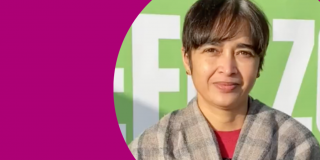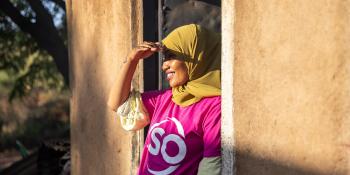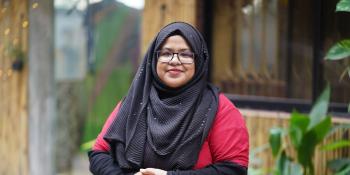
In this edition of Life at VSO, we're speaking to Ruchi Tripathi. Ruchi is a Global Practice Lead for Resilient Livelihoods located in the UK, after joining us in September 2020 during the pandemic.
What is the purpose of your role and what are your focuses?
As the Practice Lead, my role is to ensure our programming is aligned with VSO’s People First strategy, building on our unique Volunteering for Development approach, and blended volunteering model. We have just done a refresh of our livelihoods programming framework with a focus on working with marginalized young women and men, and women smallholder farmers to ensure decent livelihoods. It's really interesting work to be part of!
How long have you been at VSO?
I joined VSO in September 2020 during the pandemic, so I haven’t had a chance to visit any of our projects yet. However, I was really privileged to meet some of our volunteers in the UK and our Youth Climate Champions at events like COP26 in Glasgow who have been key supporters of our work.
How did you get to where you are now?
I studied Economics in my undergraduate degree and did a Masters in Development Studies at the London School of Economics. After this, I joined ActionAid India as a Policy and Advocacy Officer working with partners to support their efforts on advocacy, building capacity on legal literacy, right to food, and women’s rights.
I moved to ActionAid UK at the end of 1999 working on trade justice and corporate accountability, and subsequently headed up their Trade Justice and Right to Food Campaigns. I later set up Concern Worldwide UK’s first Policy and Advocacy team and launched their ‘Unheard Voices’ campaign focusing on marginalized farmers. From 2010 to 2020, I headed ActionAid International’s Right to Food and Resilient Livelihoods thematic area, with a focus on land rights, climate justice, agroecology, women’s rights.
I've also had the opportunity to represent northern civil society in the Steering Committee of the Global Agriculture and Food Security Trust Fund, housed at the World Bank. On top of this I also currently support the Civil Society and Indigenous People’s mechanism on food security as part of their women’s working group!
What does your average day look like?
I have been working virtually since the start of the pandemic. Before I open my laptop, I make myself and my family a good cup of strong ginger tea, see that the children get off to school, often filling their water bottles as my first call starts.
The rest of my day is spent in front of the computer on numerous work calls, webinars, with some time for reading and responding to emails. When I first started at VSO, I spent lots of my time in induction calls, as well as in external-facing calls – introducing VSO’s livelihoods team and work to key allies. This included both youth facing networks, as well as farmer organisations and NGOs.
My work involves reaching out to key external allies. My team continues to look for opportunities to collaborate to influence policy, or for programme quality improvement, as well as potential funding partnerships. As a team, we are also responsible for the programme direction of our livelihoods portfolio, so we've recently spent time internally discussing how we can reshape our work. This included looking at the external context, what primary actors we work with are asking us to do, as well as where we have expertise.
We also organise capacity building/mutual learning webinars and are involved in providing small grants to project teams and local partners to implement some of these innovations, often around green jobs/agroecology. On top of this, we support youth volunteers and primary actors to get involved in key external influencing opportunities. Over the past year, this has included the Food Systems Summit as well as the UN Climate Summit. We work closely with the Business Pursuit Team in ensuring all funding proposals align with our strategy, including in the selection of partners.
Which teams do you work with?
There are lots of teams I work with here at VSO! This includes working closely with the core approach advisers, external engagement and partnerships team, media team, fundraising, and HR teams. It's great that we're all connected with a unified mission!
What is one thing that you like the most about your role and work at VSO?
I really am inspired by VSO’s strategy with a clear focus on the most marginalized, our volunteering for development approach with a focus on system change, and building solidarity through volunteer networks and strengthening community structures. I am inspired by how freely volunteers give their time, and how volunteering changes their lives too.
What is different about working from home?
I do miss not being able to have chats with colleagues over a cup of tea in the office! But it's great to see that people are beginning to meet again.
What makes VSO different to other organisations?
Our volunteer networks and ability to be flexible and increase our capability by partnering with the right organisations and through the placement of specialist volunteers is quite unique compared to other organisations!
Read more
Protecting the biodiversity of the East Tonlé Sap Lake through aquaculture
Aquaculture — the farming of aquatic organisms, such as eels, shellfish, and seaweed, in a controlled environment — is transforming the lives of people like Mr Em Phat, who are living on the East Tonlé Sap Lake in Cambodia.

Five things women achieved this year that you might not know about
This International Women's Day, join us in celebrating the resilience of women across the globe with some female achievements you might not have heard about.

Breaking barriers: Lamia's journey of volunteering, leadership, and gender equity
Bangladesh - Lamia Tasnim's volunteering journey began in 2018, and over the course of the last six years, her passion for supporting her community has only grown.
